
On 17 July 2019, the VCDNP organised a panel discussion on the “End of Life Management of Sealed Radioactive Sources.” Diplomats and technical experts from 19 IAEA Member States attended the event. Speakers included Dr. Ahmad Alsabbagh, the Commissioner for Nuclear Fuel Cycle at the Jordan Atomic Energy Commission; Mr. Timur Zhantikin, the Director General at the Kazakhstan Nuclear Power Plants; and Mr. Kapila De Silva, Deputy Director at the Sri Lanka Atomic Energy Regulatory Council.

The experts discussed their experiences with the management and disposal of disused sealed radioactive sources (DSRS). They shared the challenges they face and their success stories, highlighting the support provided by the International Atomic Energy Agency (IAEA) and other international partners. Mr. Ian Gordon, the Section Head of the IAEA Waste Technology Section, also participated in the panel and explained that the IAEA’s long-term goal is for all Member States to have a sustainable capability to manage DSRS safely and securely. The IAEA provides safety standards, security guidance and practical solutions to enable the sustainable management of these sources.
The discussions focused on the variety of options available to countries for end of life management of DSRS and how countries cooperate with the international community to identify and apply the relevant options to meet their particular challenges.
Storing the sources safely in long-term storage facilities with adequate security is a commonly used option. The IAEA and international partners provide support to countries to enhance the physical security of these storage sites to protect the sources from theft or malicious use.To reduce the storage space and increase the security of the stored disused radioactive sources, the IAEA supported Jordan in the training of staff to remove sources in Categories 3 through 5 from their original containers and to place them in specialised storage capsules and containers designed and developed locally. To date Jordan has consolidated 184 of its 220 disused sources in one 20-litre container, which used to be stored in 35, 20-litre drums.
Another option for end of life management is repatriating the Category 1 and 2 DSRS to the manufacturers or to a country that has the capacity to dispose of them. Orphan sources pose a particular challenge as their origin is unknown and their containers often damaged. Sri Lanka is working with the IAEA and an international partner to repatriate its orphan sources in pre-approved packages that enable their safe and secure transport.
The panel recognized that all current available options are not permanent solutions for long-lived DSRS and that a final solution has to be found where these sources can be disposed of permanently, economically and safely. The borehole disposal system, has the potential of being one such solution. The importance of training and enhancing the capacity of counties to develop regulatory infrastructure and to keep track of their sources was also recognized by the panel, as was the importance of learning from each other’s experiences in managing the sources throughout their life time.
Read the full report here.
The panel discussion was organised with the support from the International Science and Technology Center (ISTC) in Kazakhstan.


By continuing to use the site, you agree to the use of cookies. more information
The cookie settings on this website are set to "allow cookies" to give you the best browsing experience possible. If you continue to use this website without changing your cookie settings or you click "Accept" below then you are consenting to this.